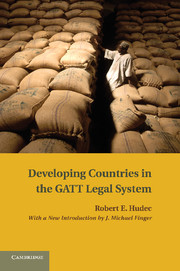Book contents
- Frontmatter
- Contents
- Foreword by Hugh Corbet
- Acknowledgments
- DEVELOPING COUNTRIES IN THE GATT LEGAL SYSTEM
- Introduction to the New Edition
- PART I A HISTORY OF THE LEGAL RELATIONSHIP
- 1 Post-war Negotiations on Trade Liberalization
- 2 First Decade of the GATT – 1948–1957
- 3 Demands for a New Legal Relationship – 1958–1963
- 4 Defining the New Relationship – 1964–1971
- 5 Testing the New Relationship – 1972–1979
- 6 Developments in the 1980s – Form without Substance
- PART II A LEGAL CRITIQUE OF THE GATT'S CURRENT POLICY
- List of References
- Index
- References
6 - Developments in the 1980s – Form without Substance
Published online by Cambridge University Press: 03 May 2011
- Frontmatter
- Contents
- Foreword by Hugh Corbet
- Acknowledgments
- DEVELOPING COUNTRIES IN THE GATT LEGAL SYSTEM
- Introduction to the New Edition
- PART I A HISTORY OF THE LEGAL RELATIONSHIP
- 1 Post-war Negotiations on Trade Liberalization
- 2 First Decade of the GATT – 1948–1957
- 3 Demands for a New Legal Relationship – 1958–1963
- 4 Defining the New Relationship – 1964–1971
- 5 Testing the New Relationship – 1972–1979
- 6 Developments in the 1980s – Form without Substance
- PART II A LEGAL CRITIQUE OF THE GATT'S CURRENT POLICY
- List of References
- Index
- References
Summary
THE FIRST half of the 1980s has produced no important change of direction in developing-country policy. The events of this period could generally be described as a further elaboration of the main themes laid down in the previous twenty years. At the level of formal recognition, the commitment of governments to current developing-country policy has continued to escalate. Practical elaboration of these general principles has also moved ahead slightly, but not with the same sense of progress. Indeed, there is a growing sense that the practical benefits of this policy may be very small, perhaps even non-existent.
The current situation, then, presents a rather odd picture of things moving in different directions. Even though there is an increasing awareness of problems at the implementing level, the formal commitment to the current policy continues to get stronger every year. As criticism of the policies of developing countries increases, so do the rhetorical and institutional barriers to reconsideration.
The present chapter describes recent developments in three areas which illustrate the current situation.
EMERGING INTERNATIONAL LAW OF DEVELOPMENT
In 1974, the United Nations adopted two major resolutions, one calling for the New International Economic Order and the other declaring a Charter of Economic Rights and Duties of States. Shortly after, legal experts in various parts of the world began working in earnest on the question of whether the principles affirmed in these documents deserved to be recognized as rights and obligations of international law proper.
- Type
- Chapter
- Information
- Developing Countries in the GATT Legal System , pp. 99 - 114Publisher: Cambridge University PressPrint publication year: 2010



